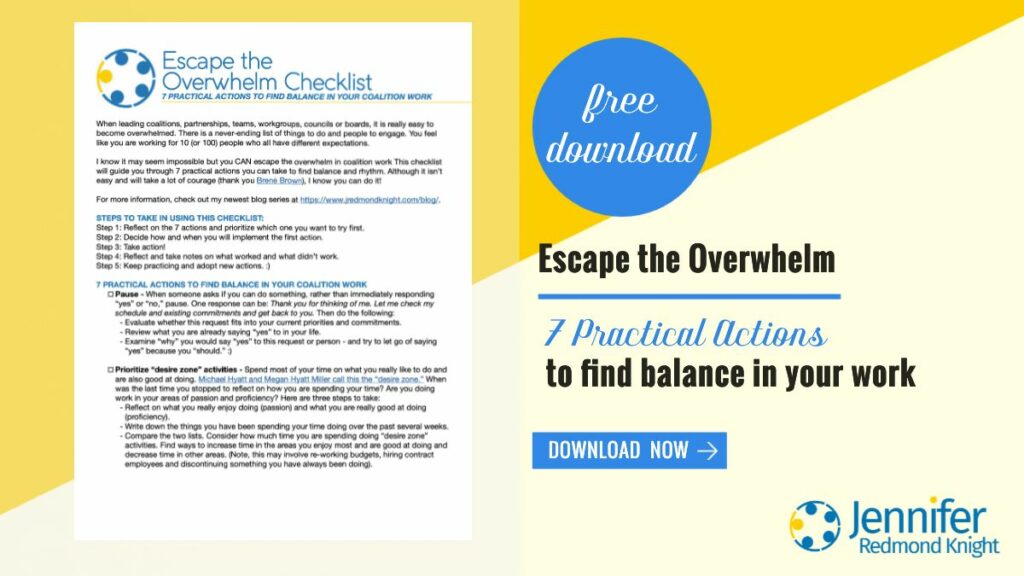In our coalition and team work, we can get caught up doing things that need to be done without considering whether we need to be the one doing them or not. We may have a meeting or a project with a long list of tasks and a short list of people to do them. Although we CAN do many of these, are they really the things we need to be doing? And perhaps more importantly, are these the things we want to be doing? I have been working with a colleague recently applying CliftonStrengthsⓇ and she comments that we tend to dismiss our strengths because we think of them as easy. However, what is “easy” for us is likely not easy for someone else. We all win when we focus on our own strengths. Join me this week for three questions to ask that will help you focus on your strengths.
Does this work energize me or drain me?
One of the best places to start is to make a list of the common things you do (both work and non-work). When you reflect on this list, which of the things do you look at and look forward to doing again very soon? These are often the things that really energize you and are areas of strength. Alternatively, which of the items on this list are things you would love for someone else to do because they are completely draining? One of my favorite resources is a journal from Emily P. Freeman, The Next Right Thing Guided Journal. This is a 12-month journal that you can start at any month and guides you through reflection questions and places to highlight things that are “life-giving” and things that are “life-draining.” If you are struggling with coming up with your list immediately, consider journaling over time and making notes when you realize you just did something that energized or drained you. I am currently reflecting on my lists over the past year and I see several key themes that help me move toward focusing efforts on my strengths. This list is also helping me determine the areas where I need to say “no,” delegate or hire someone.
What am I particularly good at doing?
While you may have clarity after considering the energizing vs. draining question, you probably need to evaluate your work a little more closely. What are those areas that are particularly easy for you? What are some areas where others affirm strengths in you? As I learned from Free to Focus by Michael Hyatt, when you evaluate your tasks closely and consider those areas you are particularly good at and you enjoy doing, this is called your “Desire ZoneTM”. These types of activities are also going to be aligned with your strengths. One of the best ways to determine these areas is to journal (as mentioned in #1) or use an online document where you can make a list of all of your common activities and then categorize them based on what you are good at doing, not good at doing, enjoy or don’t enjoy. Similar to reflecting on what energizes you and drains you, consider your areas of competency and enjoyment in both work and non-work areas. This reflection provides opportunities to consider things that may need to change in our lives so that we are more aligned with focusing our strengths.
What needs to change so that I can focus on my strengths?
Sometimes we may feel like we just “have” to do all the things in work and non-work life even though they are not in our areas of strength or competency. My daughter’s elementary school is implementing the LeaderinMeⓇ curriculum by the Franklin Covey and she came home the other day talking about the importance of being proactive and to avoid being in a place of reacting to everything. I am thrilled that my daughter (in 1st grade) is learning these important life principles that we can all keep practicing and it applies to focusing on our strengths. Although we may not “feel” like we have a choice in many situations because we are taking on the responsibility for all of the outcomes of our groups, most of us do have choices. One of the first choices is to decide not to be the one who is responsible for all of the outcomes of the groups! We may need to change our project timelines, expectations, roles and responsibilities and even our calendars. We may need to hire people to support specific areas that are not our strengths so that we can focus on our strengths. A few weeks ago, I realized I needed to protect my Wednesday mornings for focused project work. While I had a standing meeting with one of my groups at that time, I let them know that I am happy to continue working with them but I needed to change the meeting time and to consider an alternate meeting schedule. We often forget that we do have choices and we need to practice being proactive and making those choices. When we make space and time to focus on our strengths, we will be more energized, more productive and more enjoyable overall. Rather than feeling frustrated, resentful and disappointed that we are still doing the things that are not a good use of our strengths, passions, competencies and interests, we are excelling in the unique strengths and giftings that we all have. Our teams, coalitions, families, friends, communities and ourselves benefit when we focus on strengths.
As you reflect on the year, which of these questions do you need to begin asking in order to focus on your strengths, find new energy and regain your rhythm again?
One of my free resources that will help you focus on your strengths and prioritize your “Desire ZoneTM” is my Escape the Overwhelm checklist. Check it out today!

Photo by Eye for Ebony on Unsplash

